Overview
In-home support services play a vital role in providing personalized assistance to seniors and individuals with disabilities. These services enable them to maintain their independence while receiving the necessary help with daily tasks. As more individuals express a desire to age in place, the importance of these services continues to grow.
These services encompass personal care, companionship, and skilled nursing, which are essential for enhancing the quality of life. With projections indicating a demand for nearly a million support workers by 2031, it’s clear that the need for understanding and access to these resources is becoming increasingly urgent.
We understand that navigating these options can be overwhelming for families. That’s why it’s crucial to seek out the right support. Remember, your comfort and well-being are our priority, and we’re here to help you every step of the way.
Introduction
In-home support services are transforming the way individuals receive care, enabling them to flourish in the comfort of their own homes. This comprehensive approach includes both medical and non-medical assistance, specifically designed for seniors and those with disabilities. As more families prefer aging in place, they increasingly turn to these services, ensuring their loved ones can maintain independence while receiving essential support for daily activities.
As the demand for personalized care continues to grow, understanding the landscape of in-home support becomes vital. From navigating payment options to recognizing who can benefit most, this exploration reveals how tailored services can enhance quality of life and empower both clients and caregivers.
We’re here for you, and your comfort is our priority. Together, we can make a difference in the lives of those you love.
What Are In-Home Support Services?
Home support services encompass a wide range of both medical and non-medical help, thoughtfully customized for individuals in their own homes. These vital offerings are especially important for seniors and people with disabilities, allowing them to maintain their independence while receiving necessary assistance with everyday tasks. Typical services include personal assistance—such as bathing, dressing, and grooming—companionship, meal preparation, medication management, and skilled nursing support.
Since 1980, Best Care Nurses Registry has been dedicated to delivering personalized home health support in South Florida. Our mission is to ensure that seniors receive the finest assistance at home, in the hospital, or in assisted living facilities. As of 2025, it is estimated that approximately 12% of seniors will utilize in-home assistance services, reflecting a significant trend towards aging in place. This shift is motivated by an increasing desire among older individuals to remain in familiar settings rather than relocating to assisted living facilities, where over 1.4 million people currently reside in Medicare- and Medicaid-certified establishments.
The demand for in-home support services is expected to surge significantly, with a projected need for 924,000 personal support attendants and home health workers between 2021 and 2031. This trend highlights the importance of understanding the various types of assistance available, as families strive to make the best choices for their loved ones. Notably, certified caregivers earn an average base wage of $15.65 per hour, underscoring the value of professional in-home support services.
Effective in-home support services, such as those provided by Best Care Nurses Registry, have shown that individualized help not only enhances the quality of life for seniors but also nurtures a sense of autonomy. By offering tailored assistance that meets personal needs, these programs empower seniors to engage actively in their daily activities. With flexible assistance options, including round-the-clock availability, Best Care distinguishes itself in a competitive landscape where home health agencies must differentiate their offerings from nursing facilities.
Recent advancements in the field highlight the growing recognition of in-home aid as a viable alternative to institutional care. Platforms like Shortlister assist families in selecting HR and benefits providers, equipping them to navigate the complexities of home healthcare more effectively.
In conclusion, in-home support services play a crucial role in the lives of seniors, offering a comprehensive array of assistance that fosters independence and well-being. Best Care Nurses Registry’s commitment to quality patient support ensures that families can discover the best solutions for their loved ones, making the journey of aging at home a safe and rewarding experience. If you have questions or would like to schedule a consultation, please reach out to Best Care Nurses Registry at (888) 203-2529. We’re here for you.
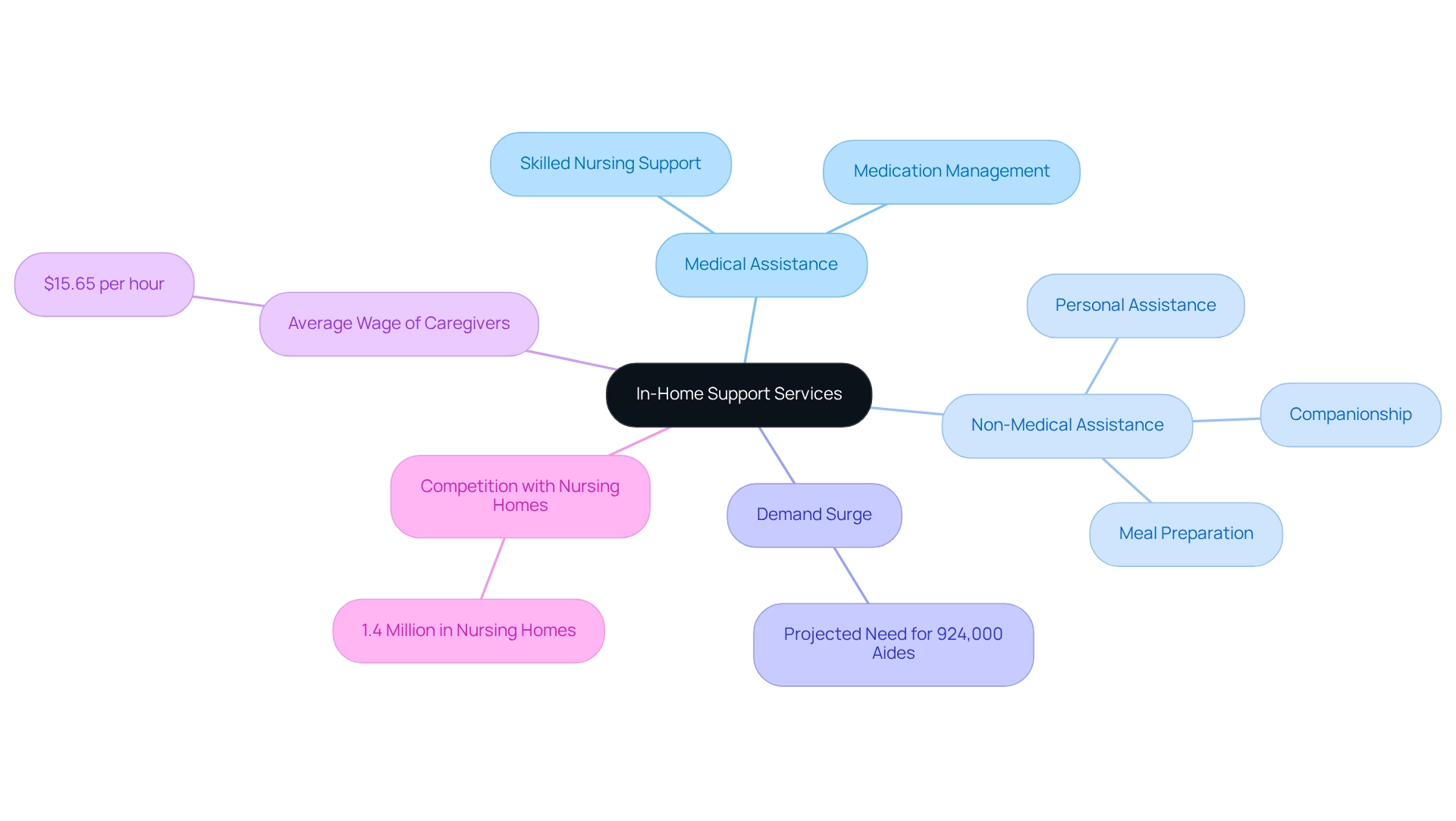
Who Can Benefit from In-Home Support Services?
In-home support services cater to a wide range of individuals, each with unique needs that can significantly benefit from personalized assistance. Key groups include:
- Seniors: Older adults often face challenges with daily activities due to age-related decline. In-home care, provided by dedicated CNAs and HHAs, can offer the necessary assistance to help them maintain their independence and enhance their quality of life. These caregivers play a crucial role in monitoring health conditions and keeping family members informed about their loved ones’ well-being.
- Individuals with Chronic Illnesses: Those managing conditions such as diabetes, heart disease, or arthritis frequently require ongoing assistance. Studies show that roughly 80% of veteran support recipients after 9/11 have mobility-limiting disabilities, highlighting the significance of customized in-home assistance for this group. Professional caregivers ensure that these individuals receive the right assistance to manage their health effectively.
- Post-Surgery Patients: Individuals recovering from surgery often need temporary assistance during their rehabilitation. In-house assistance can enable a smoother recovery process, allowing patients to heal in a familiar setting while receiving tailored help that meets their specific requirements.
- People with Disabilities: Individuals with physical or cognitive impairments may require help with daily living activities. In-home care services can offer the necessary assistance to improve their quality of life and ensure safety at home, allowing them to live more independently.
Identifying these groups is essential for households contemplating in-home support, as it emphasizes the possible requirement for aid customized to particular situations. The emotional burden of caregiving can be substantial; research indicates that caregivers often endure severe stress, which can result in premature aging—potentially reducing their lifespan by up to ten years, as highlighted by Elissa S. Epel from the University of California, San Francisco. Moreover, the economic influence of caregiving is significant, with numerous caregivers encountering financial difficulties, frequently giving up their economic security to offer support.
A case study titled ‘Economics of Caregiving’ reveals that relatives providing care, particularly women, are more likely to live in poverty compared to non-caregivers, emphasizing the financial burden of caregiving.
Reviews from households employing in-home assistance illustrate the impactful outcomes of such help. Many report decreased stress and enhanced well-being for both providers and recipients of support. As the demand for in-home assistance continues to rise, grasping who gains from these resources is crucial for families managing the intricacies of caregiving in 2025 and beyond.
Best Care Nurses Registry, with its extensive experience and strong reputation as a preferred choice for home health assistance in South Florida since 1980, stands out as a reliable provider in this field, dedicated to enhancing the quality of life and independence of seniors and individuals of all ages. We’re here for you—call (888) 203-2529 to schedule a call to discuss your needs.
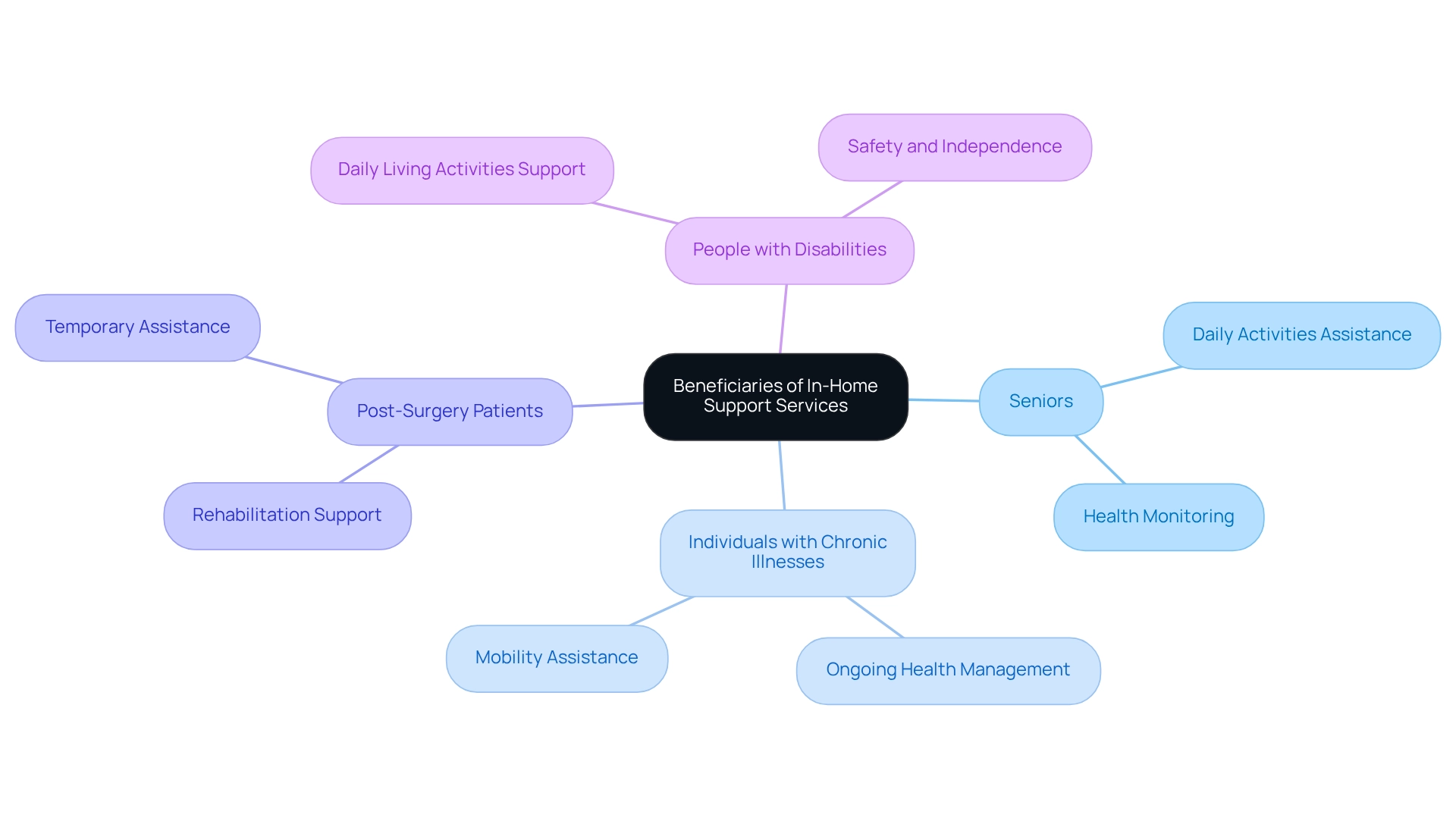
How In-Home Support Services Work
In-home support services are designed to provide comprehensive and personalized assistance, typically following a structured process that effectively addresses the unique needs of each individual. The journey begins with a comprehensive needs evaluation, essential for recognizing the particular requirements of those in need of assistance. This evaluation assesses not only medical needs but also individual preferences and lifestyle elements, ensuring a holistic approach to support.
Indicators such as difficulty with daily activities, managing medications, or health concerns like chronic conditions are key factors in determining the necessity for CNA/HHA caregiver services.
Following the assessment, a customized support plan is created. This plan details the categories of services needed, the frequency of assistance, and any particular objectives that the individual aims to accomplish. For instance, a personalized support plan may involve help with daily tasks, medication management, and companionship, all intended to enhance quality of life. Best Care Nurses Registry highlights the significance of tailored treatment plans to guarantee that each client receives the assistance they require.
One of the key elements of effective in-home support is the careful matching of caregivers to clients. This process considers the skills and experience of the caregiver, as well as compatibility with the client’s personality and preferences. Such thoughtful assignments foster trust and comfort, essential for a successful caregiving relationship. The caregivers referred by Best Care Nurses Registry are meticulously screened and committed to excellence, ensuring that your loved one enjoys healthy, meaningful days at home.
The organized method does not conclude with the initial treatment plan. Routine check-ins and evaluations are performed to guarantee that the support provided remains aligned with the changing needs of the client. This continuous oversight allows for modifications to the treatment plan as necessary, ensuring that the individual receives optimal assistance throughout their recovery process. Maintaining transparent communication with caregivers and the home support agency is vital for addressing any concerns and ensuring quality assistance.
This comprehensive framework not only meets the immediate needs of clients but also adapts to their evolving situations, providing households with peace of mind. With an average of 286,300 individuals in adult day programs reported daily, the significance of in-home support services is increasingly acknowledged as a crucial element of health management, especially for those who wish to remain in the comfort of their own residences. Furthermore, as certified caregivers receive an average base pay of $15.65 per hour, understanding the economic factors of caregiving can resonate with families in need of assistance.
Additionally, in an environment where more than 1.4 million individuals live in nursing facilities, home support agencies such as Best Care Nurses Registry must distinguish their offerings to attract clients, emphasizing the importance of customized support plans and continuous oversight. This aligns with the broader goals of Population Health Management, which aims to improve health outcomes while effectively managing costs.
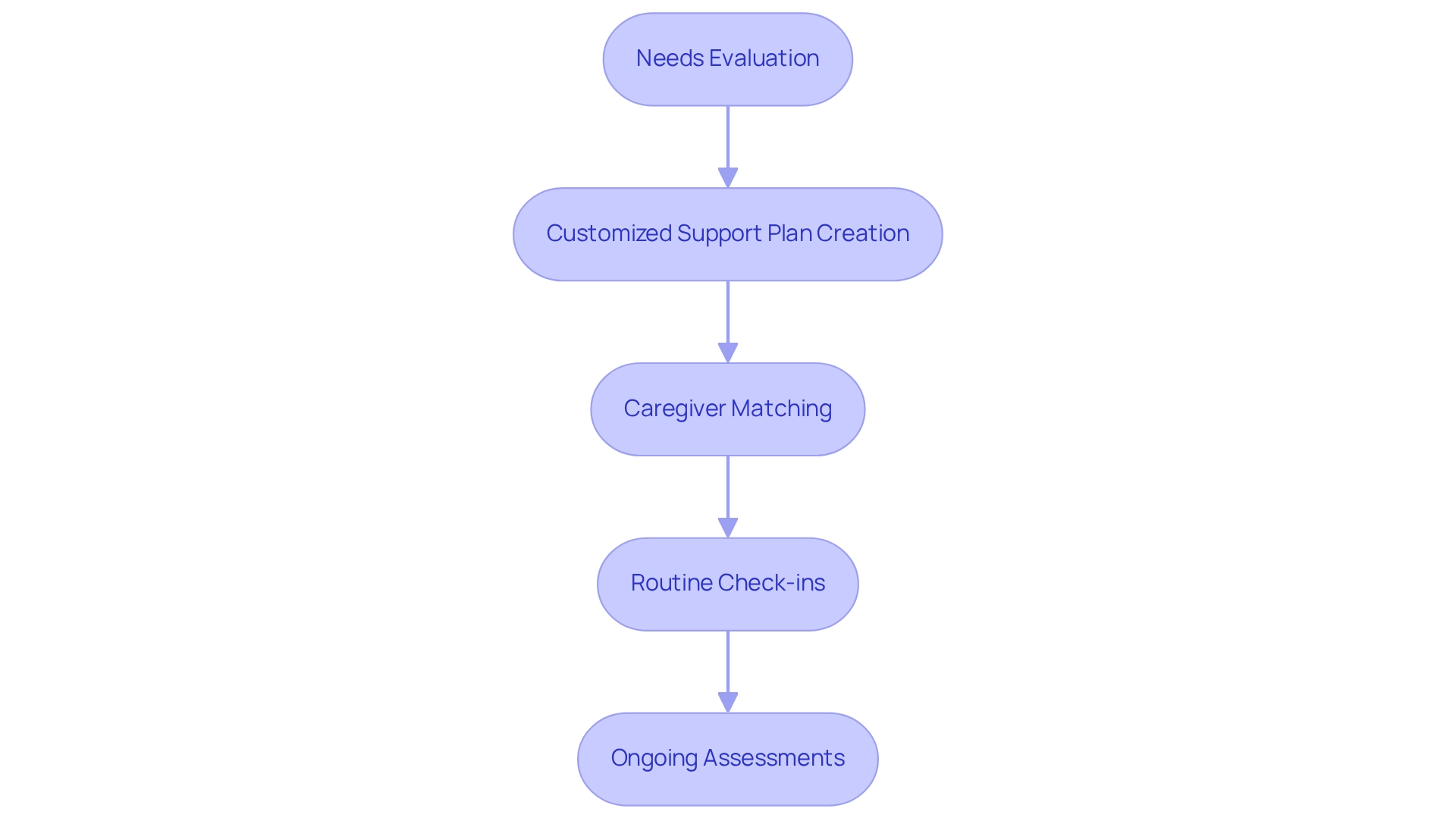
Understanding Payment Options for In-Home Support Services
Compensation for in-home support services can vary significantly based on the type of support needed and the provider chosen. Understanding the available payment options is essential for families navigating this landscape. Here are the main approaches for funding in-home assistance:
-
Private Pay: Many families opt to pay directly for in-home support. This method allows flexibility in selecting providers and tailoring options to specific needs. However, it can quickly become expensive, especially for extended support.
-
Insurance Coverage: More health insurance plans, including long-term support insurance, may cover in-home assistance services. At Best Nurses Registry, we accept most long-term support insurances directly on your behalf. Typically, carriers require a form called an assignment of benefits (AOB) to be completed by the policyholder, directing the carrier to pay Best Care directly. We handle the paperwork and await payment from the carrier. Families should carefully review their policy details and consult with their insurance providers to understand the extent of coverage available. Interestingly, around 70% of households using long-term support insurance report that it significantly alleviates the financial burden of in-home support services. It’s important to note that Medicare does not assist with activities of daily living like private duty caregivers offer, focusing instead on skilled visits, which can be brief.
-
Government Assistance: Programs like Medicaid and the In-Home Supportive Services (IHSS) program provide financial assistance to eligible individuals. These programs can help cover expenses related to in-home support services, making them more attainable for families in need. It’s crucial for families to thoroughly explore these options to identify potential financial aid.
Recent trends indicate that states are actively addressing provider shortages and enhancing payment rates for in-home support services. Proposed regulations requiring states to report Medicaid payment rates may lead to increased spending on long-term services and supports (LTSS), even though no new federal funding is currently available to cover these costs. Moreover, the demand for home healthcare providers is expected to rise, with an estimated need for 924,000 personal support aides and home health aides between 2021 and 2031, underscoring the urgency for families seeking assistance.
Real-world experiences highlight the importance of understanding insurance coverage for home health services. Families who have successfully navigated the complexities of long-term insurance have found that proactive communication with their insurers and thorough documentation of support needs have been vital in maximizing their benefits. Additionally, the pandemic has led to lasting shutdowns of HCBS providers in many areas, revealing the challenges faced by the sector and the subsequent measures taken by states to strengthen the workforce and improve availability.
In conclusion, families seeking in-home support services should consider a combination of private payment, insurance benefits, and government assistance to effectively manage the costs associated with care. By exploring all available options, families can ensure that their loved ones receive the necessary support while maintaining financial stability. Additionally, families should be aware that they may be responsible for payment if their insurance carrier does not cover any or all of the bill, and in many cases, services can commence immediately without any out-of-pocket payment unless there is an elimination period.
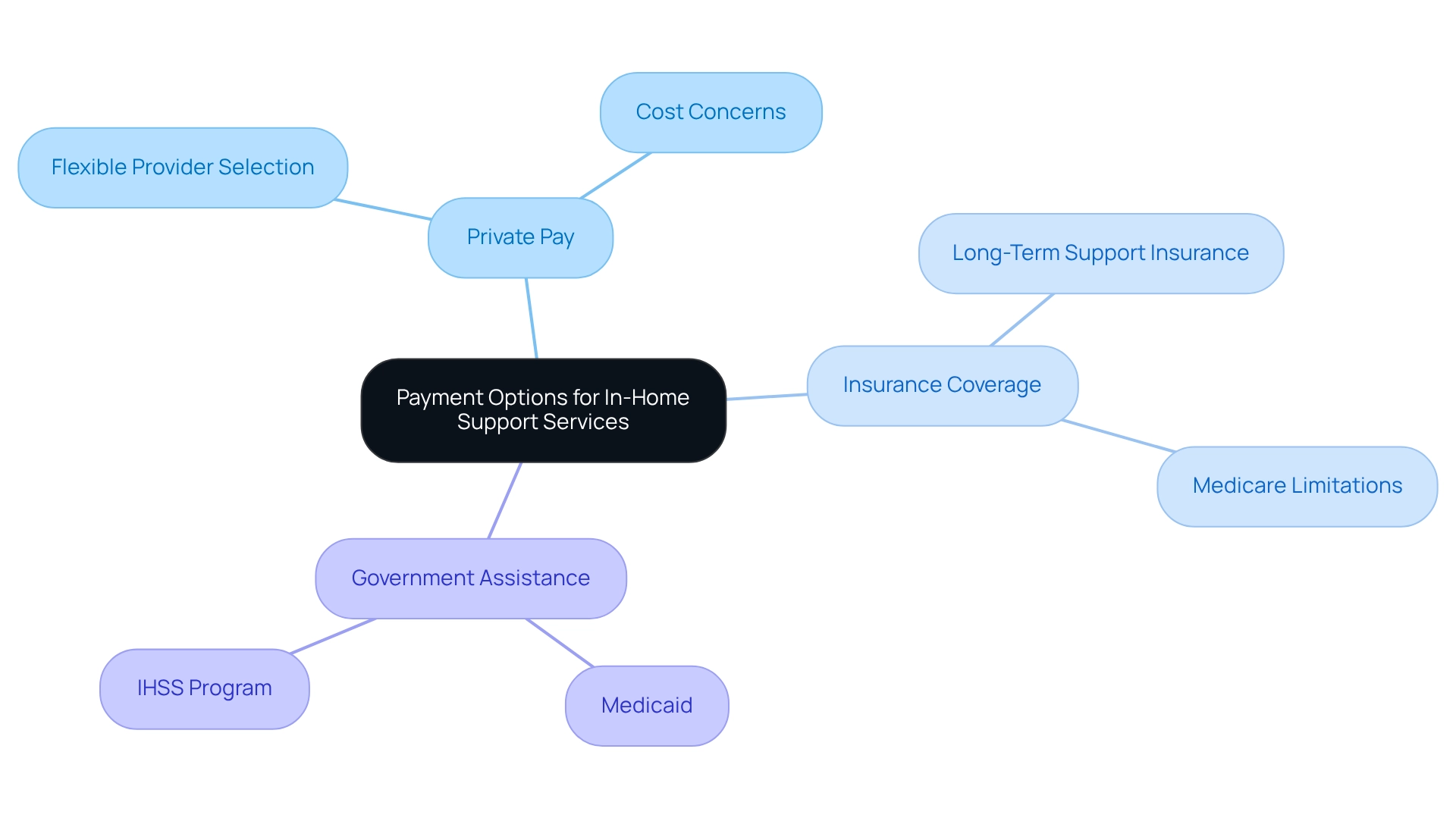
The Needs Assessment Process
The needs assessment process is essential for identifying the appropriate level of assistance for individuals requiring in-home support. This process typically unfolds in several key stages:
-
Initial Consultation: This first step involves a meeting with a support coordinator or social worker, where the individual’s health status and specific assistance needs are discussed. This dialogue is crucial for establishing a foundation for personalized care.
-
Home Visit: A comprehensive evaluation of the individual’s living environment and capabilities is conducted during a home visit. This evaluation enables caregivers to understand the physical environment and any potential obstacles the individual might face, ensuring that support is customized to their unique situation.
-
Documentation Review: Gathering medical records and other pertinent information is vital to inform the assessment. This evaluation aids in understanding the person’s medical history and current health situations, which are essential for formulating an effective treatment plan.
-
Support Plan Development: Based on the findings from the assessment, a tailored support plan is created to address the individual’s specific needs. This plan details the types of services needed, including companionship, personal assistance, or skilled nursing, ensuring that families receive the appropriate support customized to their loved one’s circumstances.
The significance of a thorough needs evaluation cannot be overstated. It not only promotes the well-being and safety of seniors but also enhances their quality of life within the community. According to recent studies, effective communication among providers of support, including certified nursing assistants (CNAs), physical therapists (PTs), occupational therapists (OTs), and registered nurses (RNs), is vital for delivering comprehensive assistance. Each provider plays a distinct role, and their collaboration is essential for addressing the diverse needs of patients. However, HIPAA restrictions can sometimes limit this communication, potentially omitting critical information that could influence treatment outcomes. Best Care Nurses Registry addresses these challenges by adopting secure communication protocols that ensure essential information is exchanged among providers while upholding compliance with regulations.
Statistics show that around 286,300 individuals engage in adult day programs daily, underscoring the increasing demand for effective in-home support options. This statistic highlights the importance of a comprehensive needs evaluation process, as families seek trustworthy support alternatives for their loved ones. The average duration of needs assessments can vary, but they typically take several hours to ensure a thorough understanding of the individual’s requirements. Social workers emphasize that a preliminary consultation is essential, as it establishes the foundation for an effective evaluation process.
In 2025, the needs evaluation process for in-home support services continues to advance, emphasizing the incorporation of technology and best practices to improve service delivery. Home assessments play an important role in caregiving, as they provide insights into the living conditions and needs of individuals, ultimately resulting in improved outcomes. By prioritizing a comprehensive needs assessment, families can ensure that their loved ones receive the individualized support they deserve.
Furthermore, Best Care Nurses Registry is dedicated to maximizing long-term support insurance benefits and offers various flexible payment options, including private pay, assignment of benefits from long-term support insurance companies, and assistance from VA Aide and Attendance Pension. This reinforces Best Care’s position as a leader in the home health care industry. For more information or to schedule a consultation, please contact Best Care Nurses Registry at (888) 203-2529.
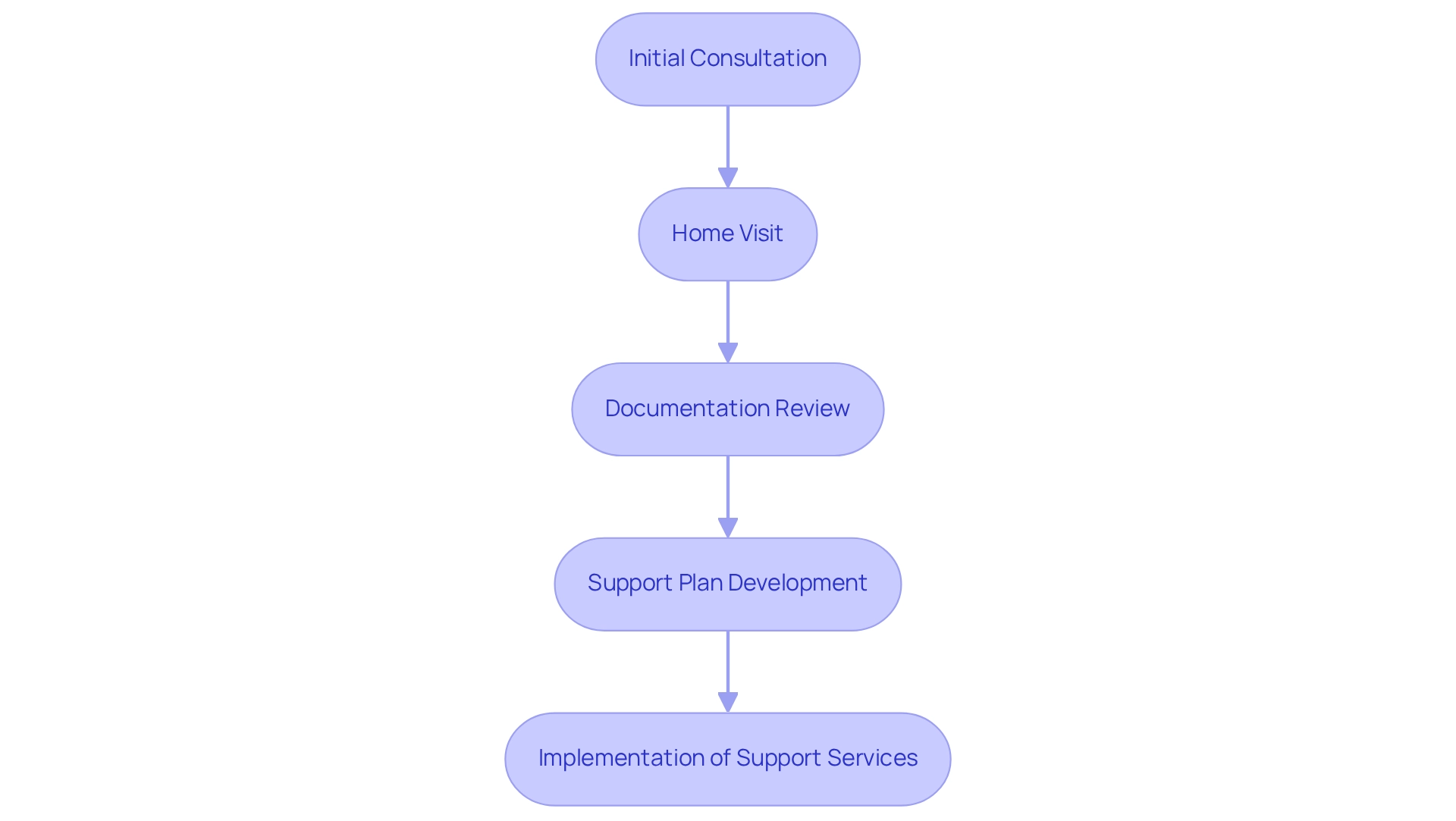
How to Apply for In-Home Support Services
Requesting in-home assistance can feel overwhelming, but with a methodical strategy, families can simplify the process significantly. Here are the essential steps to follow:
-
Research Providers: Begin by locating nearby organizations, such as Best Care Nurses Registry, that specialize in in-home assistance. Take the time to explore their options, identifying those that align with your specific needs, including CNA and HHA support that cater to both medical and personal care requirements.
-
Contact Providers: Reach out to the chosen providers to inquire about their offerings, availability, and associated costs. This initial communication is crucial for understanding what each agency can provide, including personalized caregiver matching services that ensure compassionate home health care.
-
Schedule an Assessment: Arrange for a comprehensive needs assessment with the selected provider. This evaluation is vital for identifying the individual’s support needs and ensuring that the appropriate level of assistance is recognized. Consider key indicators such as difficulty with daily activities, managing medications, and overall health status.
-
Complete Application Forms: Fill out the necessary application forms and provide any required documentation, such as medical records and insurance information. This step is essential for facilitating a smooth approval process.
-
Review Treatment Plan: After receiving approval, thoroughly examine the proposed treatment plan. Make any necessary adjustments to ensure it meets the individual’s needs before services commence. Engaging with Best Care Nurses Registry allows families to develop customized home health services that enhance the quality of life for seniors.
This organized method not only simplifies the application process but also empowers families to make informed choices regarding in-home support. With the rising demand for home healthcare—projected to require 924,000 personal support aides and home health aides by 2031, according to MarketsandMarkets—understanding these steps is more crucial than ever. Additionally, considering that one in four adults over the age of 65 experiences a fall each year, having in-home caregivers can significantly enhance safety and reduce risks for seniors.
The waiting period to see a doctor may take up to 15 days, underscoring the importance of timely access to in-home support services. By following these steps, households can navigate the application process effectively and secure the essential assistance for their loved ones. Resources such as blogs, case studies, and webinars related to home healthcare software are also available to assist families as they navigate this process.
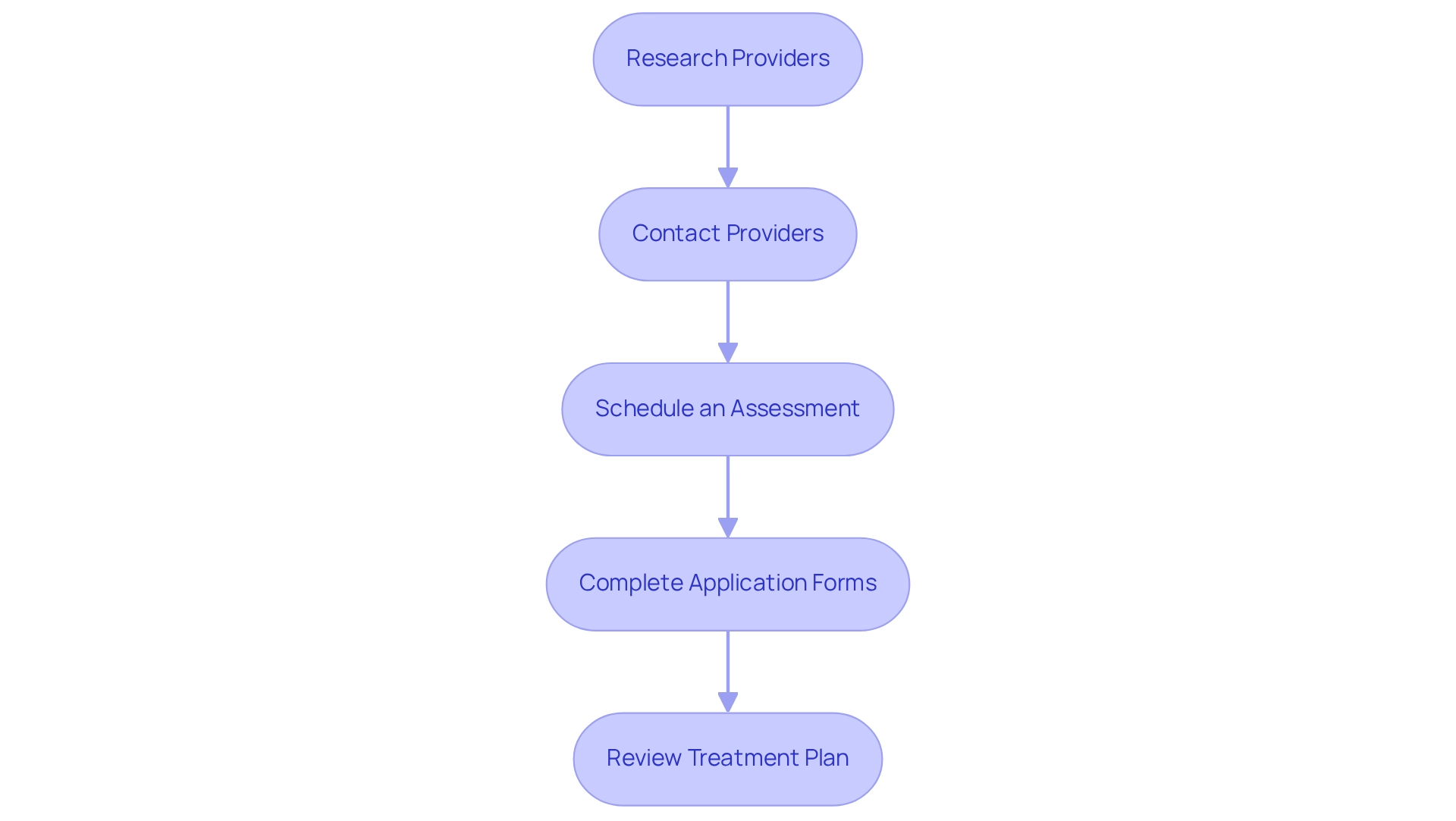
Ensuring Safety and Quality in In-Home Support Services
Ensuring safety and quality in in-home support services is essential for peace of mind for families. This involves executing several crucial practices that prioritize the well-being of clients.
-
Provider Training: It’s vital for providers to ensure that assistants receive comprehensive training in safety protocols, emergency procedures, and best practices for personal assistance. This training not only equips caregivers with the necessary skills but also boosts their confidence in handling various situations, ultimately benefiting the clients they serve. While CNAs (Certified Nursing Assistants) typically undergo extensive training focused on medical duties, HHAs (Home Health Aides) are educated in personal assistance and daily living activities. Standardized assessments and individualized training are crucial for tailoring these strategies effectively.
-
Background Checks: Thorough background checks are a fundamental part of hiring caregivers. These checks help confirm the qualifications and reliability of caregivers, providing families with reassurance that their loved ones are in capable hands. Statistics indicate that a significant proportion of caregivers undergo these assessments, reinforcing the commitment to safety in home health services.
-
Regular Monitoring: Ongoing evaluations and feedback from clients and their families are vital for maintaining high standards of support. Consistent oversight allows providers to address any issues promptly and adapt support plans as needed, ensuring that services align with clients’ changing needs. This is particularly important for seniors who may require continual adjustments to their treatment plans due to evolving health situations.
-
Client-Centered Support: Prioritizing the unique needs and preferences of clients fosters a secure and pleasant environment. By customizing support to each individual’s circumstances, providers can enhance the overall experience and satisfaction of clients, which is essential for their well-being. Emotional support and companionship from caregivers can significantly improve the quality of life for seniors, helping to alleviate feelings of loneliness and depression.
These measures collectively help families feel secure in the care provided to their loved ones. For instance, the Older Adult Helping Program in Shanghai, initiated in 2018, aimed to support informal caregivers through training. However, the program’s lack of systematic assessment of caregivers’ training needs underscored the importance of tailored training strategies.
By 2021, over 25,880 participants had received training, yet the absence of a needs assessment could lead to a disconnect between the training offered and the actual assistance required. In contrast, Best Care Nurses Registry emphasizes the significance of individualized training and assessments to ensure caregivers are well-prepared to meet the specific needs of their clients.
As we look toward 2025, with one in four adults over the age of 65 experiencing a fall each year, the focus on safety protocols in in-home support services becomes even more critical. Adopting optimal strategies from industry experts, such as ensuring that caregivers are properly trained and consistently evaluated, can significantly reduce risks and enhance the quality of assistance.
By implementing these strategies, providers of in-home support services can ensure that they deliver not only compassionate but also safe and effective care, reassuring families that their loved ones are in good hands.
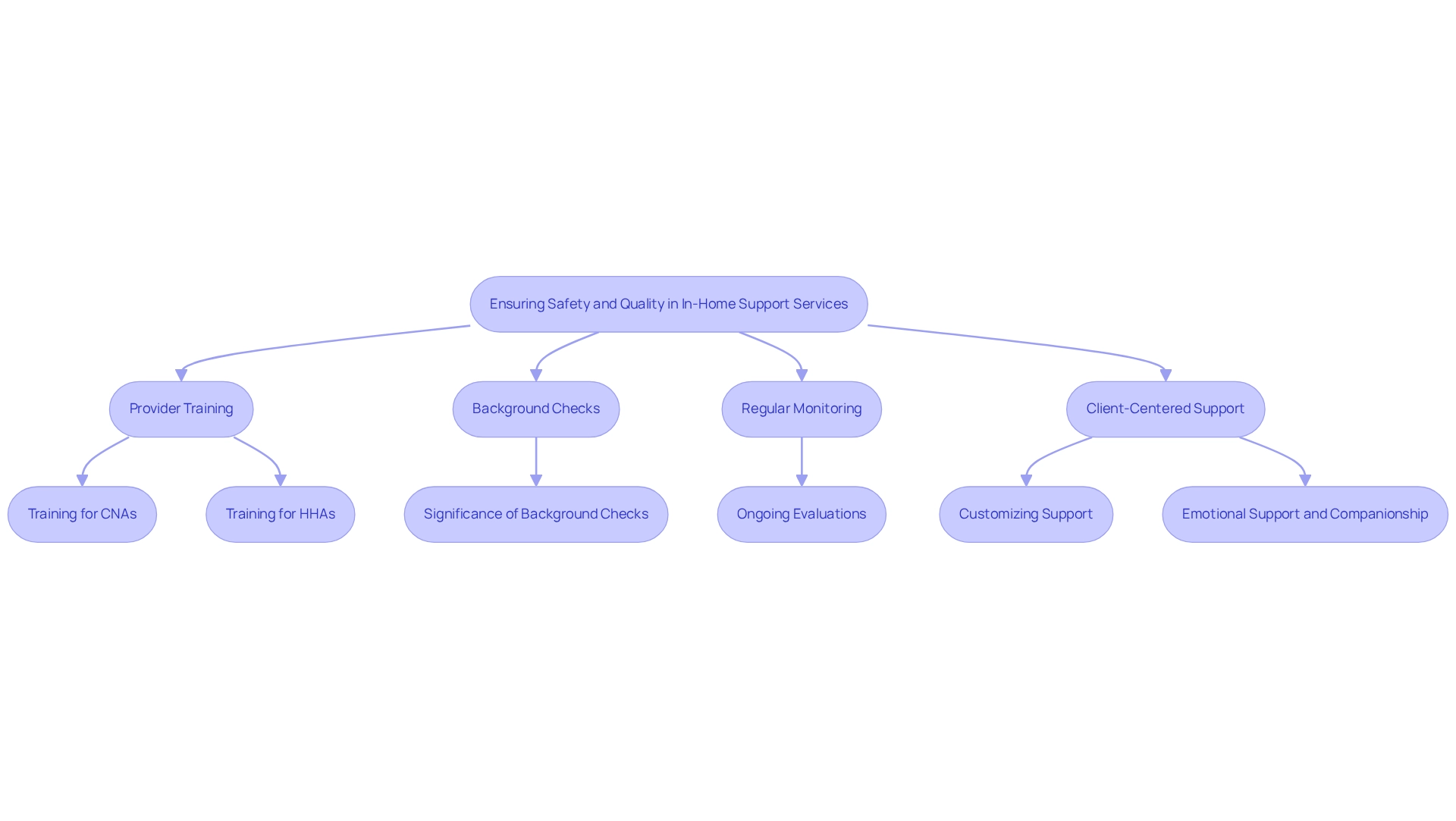
Additional Resources for Families Seeking In-Home Support
Families seeking in-home support services can access a range of essential resources aimed at enhancing their caregiving experience. These include:
-
Local Aging Agencies: Many communities are served by dedicated agencies that assist seniors and their families in navigating care options and accessing necessary resources. These organizations play an essential role in linking households with local services customized to their particular needs. A significant percentage of households depend on these organizations for support and resources, highlighting their importance in the caregiving journey.
-
Support Groups: Joining caregiver support groups can provide invaluable emotional support and practical advice from others facing similar challenges. These groups foster a sense of community and understanding, helping caregivers manage the emotional toll of their responsibilities. As noted by Elissa S. Epel from the University of California, San Francisco, “Family caregivers experiencing extreme stress have been shown to age prematurely. This level of stress can take as much as 10 years off a caregiver’s life.”
-
Online Resources: Websites such as AARP and the National Institute on Aging offer a wealth of information on caregiving, financial assistance, and local services. These platforms serve as thorough resources for households looking to comprehend their choices and rights concerning in-home support services.
Furthermore, families should explore state and federal programs that provide financial assistance or resources for in-home support services. With only 11 states and D.C. currently providing paid leave for caregivers, understanding available government support is essential for households aiming to ease the financial strain of caregiving.
- Risks of Inadequate Care: Without CNA/HHA services, seniors face significant risks, including health decline due to lack of monitoring, poor nutrition from inadequate meal preparation, hygiene issues leading to infections, mobility challenges increasing fall risks, social isolation contributing to mental health issues, household hazards from unmanaged tasks, and medication mismanagement.
Utilizing these resources can significantly enhance the caregiving experience, ensuring that loved ones are well-informed and supported in their journey. For example, a case study named ‘Elevating Alzheimer’s Assistance: The Role of Home Service Providers’ emphasizes how personalized home assistance can significantly enhance the quality of life for patients, highlighting the significance of customized help. By leveraging these tools, families can navigate the complexities of in-home support services more effectively, ensuring their loved ones receive the compassionate care they deserve from Best Care Nurses Registry.
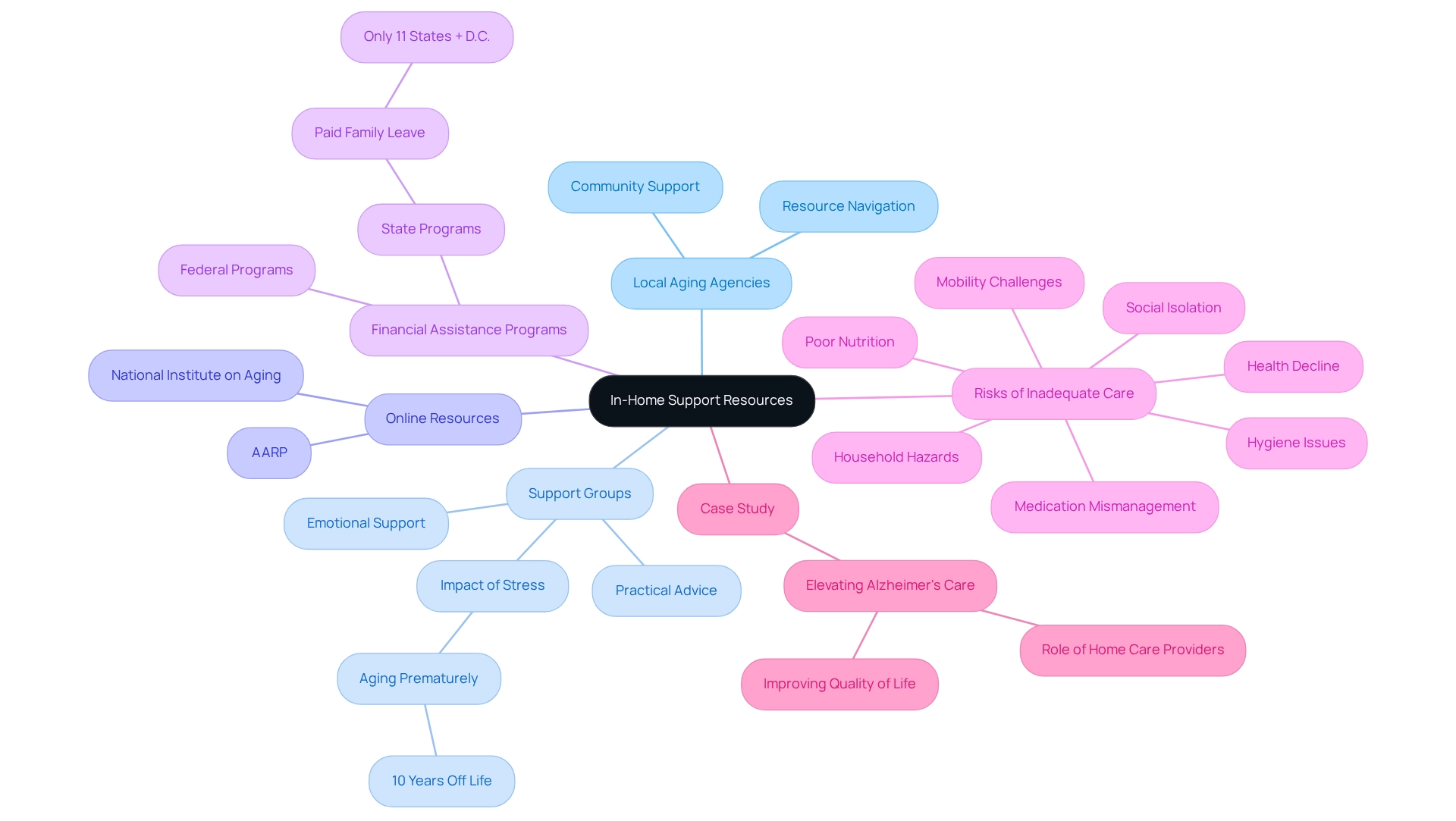
Conclusion
In-home support services are a transformative solution for individuals seeking personalized care while cherishing their independence. These services encompass a wide range of medical and non-medical assistance, tailored to meet the unique needs of seniors and individuals with disabilities. As more people prefer aging in place, understanding the various types of available in-home support becomes increasingly vital. From personal care to skilled nursing, these services are designed to enhance clients’ quality of life, allowing them to thrive in the comfort of their own homes.
The landscape of in-home support services is evolving. Families are now more aware of the benefits of personalized care. The structured process of assessment, care plan development, and ongoing monitoring ensures that each individual receives the right level of support tailored to their specific circumstances. Furthermore, understanding payment options—from private pay to insurance coverage and government assistance—empowers families to make informed decisions that align with their financial situations.
Ultimately, the commitment of providers like Best Care Nurses Registry to deliver quality services reinforces the message that in-home support is not just a necessity but a valuable option for many families. By prioritizing safety, caregiver training, and client-centered care, these services can significantly improve the well-being of both clients and their families. As the demand for in-home care continues to rise, recognizing its vital role in promoting independence and enhancing quality of life is essential for families navigating this journey.
The future of in-home support services holds great promise. It ensures that individuals receive the compassionate care they deserve while living comfortably at home. Remember, we’re here for you, and your comfort is our priority. If you or a loved one is considering in-home support, don’t hesitate to reach out. Together, we can make a difference in your journey toward enhanced independence and well-being.
Frequently Asked Questions
What are home support services?
Home support services include a variety of medical and non-medical assistance tailored for individuals in their homes, particularly benefiting seniors and people with disabilities. Services typically offered include personal assistance with daily tasks, companionship, meal preparation, medication management, and skilled nursing support.
Why are home support services important for seniors?
Home support services help seniors maintain their independence while receiving necessary assistance with everyday tasks, allowing them to stay in familiar environments rather than moving to assisted living facilities.
What is the trend regarding the use of in-home assistance services among seniors?
It is estimated that by 2025, approximately 12% of seniors will utilize in-home assistance services, reflecting a growing desire among older individuals to age in place.
What is the projected demand for personal support attendants and home health workers?
Between 2021 and 2031, there is a projected need for 924,000 personal support attendants and home health workers, indicating a significant increase in demand for in-home support services.
What are the average wages for certified caregivers?
Certified caregivers earn an average base wage of $15.65 per hour, highlighting the value of professional in-home support services.
How do effective in-home support services benefit seniors?
Effective in-home support services enhance the quality of life for seniors by providing individualized help that fosters autonomy and encourages active engagement in daily activities.
Who can benefit from in-home support services?
Key groups that can benefit from in-home support services include seniors, individuals with chronic illnesses, post-surgery patients, and people with disabilities.
What challenges do caregivers face?
Caregivers often experience significant emotional stress, which can lead to premature aging and financial difficulties, as many may sacrifice their economic security to provide care.
How does Best Care Nurses Registry support families seeking in-home assistance?
Best Care Nurses Registry, established in 1980, provides personalized home health support in South Florida, helping families find the best solutions for their loved ones’ needs.
How can I contact Best Care Nurses Registry for more information?
You can reach Best Care Nurses Registry at (888) 203-2529 to schedule a consultation or for any inquiries regarding in-home support services.











